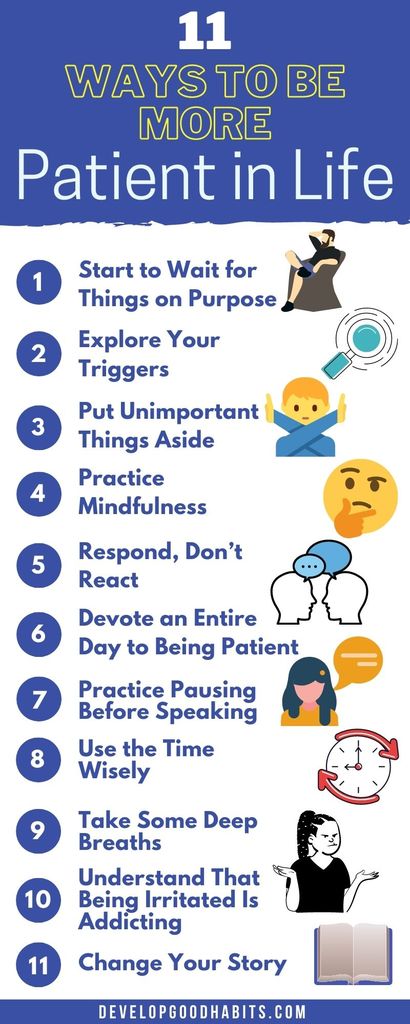Since you’re here, I’d be willing to guess that you’ve had it up to here a bit too frequently…and you’re looking for some relief.
I can relate. Kids. Work. Personal and familial relationships. Interruptions from co-workers. Deadlines. Traffic.
Time goes by quickly and days are overwhelming. And what does this lead to? A complete loss of patience.
I don’t have time to wait for the person who is checking out in front of me to fix their complicated issue. Oh, and every. single. time. I pick a tollbooth lane, it’s behind the one person who can’t figure something out.
I’d say I have a pretty low tolerance for delay, and I think that the final straw to prove that is that I’m the one touching the elevator button several times in a row, thinking it will recognize that I seriously need to be somewhere—apparently 2-3x as much as anyone else.
Like a lot of people in our society, I prefer to have what I need right about now.
And, if you really want to know how patient other people are– according to a British survey, the average person gets frustrated within 16 seconds of waiting for a website to load, and 25 seconds for a traffic light to turn green.
I believe it.
In this article, we are going to talk a little about patience and the importance of having it. Then we will look at 11 ways that you can increase the amount of patience you have in your life.
Let’s start by defining patience and looking at how important it is to develop (if you don’t already have it).
What Is Patience and Why Do I Need It?
Dictionary.com seems to have the most comprehensive definition of patience. They offer three definitions:
“The quality of being patient, as the bearing of provocation, annoyance, misfortune, or pain, without complaint, loss of temper, irritation, or the like.”
To me, this means being able to stay calm when you’re aggravated.
“An ability or willingness to suppress restlessness or annoyance when confronted with delay.”
This one clearly has to do with time, so if you are very protective of your time or you’re often rushed, but you can accept unexpected delays, you would be considered to be patient.
“Quiet, steady perseverance; even-tempered care; diligence.”
So, pretty much having the willingness to keep going, even if things aren’t going your way.
And what is patience in layman’s terms? It’s basically a practice of self-control.
Without having patience after a long day, you will undoubtedly experience ego depletion, which means you’re no longer able to regulate your thoughts, feelings, or actions.
What kind of impact do you think that could have on your life?
Your willpower to have patience takes a bit of a nosedive throughout the day because you’re constantly using it, and by the time dinner has been cleared, you’re completely depleted.

Everyone reaches their limit, and once you’ve gotten to that point, it becomes nearly impossible to have any type of patience for something standing in your way. If you’re tempted to yell at your kids at night for misbehaving, that’s the time you’re probably going to do it.
However, if you can learn to improve your patience, you will be able to pause before you react to something unexpected and gain control of your thoughts.
Building patience will also:
To avoid having adverse reactions to situations such as these, it’s important to learn how to develop patience. Let’s look at a few ways you can do this.
11 Ways to Be More Patient in Life
1. Start to Wait for Things on Purpose
Weird, but true. One of the most effective ways to become more patient is to literally make yourself wait for things.
Research published in Psychological Science reports that making yourself wait for things that you want can not only increase your patience, but also make you happier in the long run.
You can start small by putting that unopened package on your front step aside when you get home and tend to it later. Then you can try bigger things like putting off a purchase that you really want.
And, if you’re among the 96% of people who will knowingly eat or drink something that will burn your mouth because you don’t have the patience to wait? Just chill for a sec. Literally.
Your patience will grow with time. (And to make the wait less boring, listen to these songs about waiting.)
2. Explore Your Triggers
You’re probably more willing to be patient in some circumstances than in others, so what makes the difference?
As you pay closer attention to losing your patience, think about the antecedents to these events.
What was going on right before you lost your patience? Is it when a coworker isn’t responding to an urgent email? Your spouse isn’t answering their phone? Your child won’t stop singing that song about sharks?
Some triggers will happen more often than others, and you can work up to focusing on the situations that really grind your gears the most. But start with something manageable–a trigger that only makes you a little impatient, not something that sets you off the edge.
If you can gain control over this first trigger, take the skills you learned from that exercise and apply it to another trigger. One by one, with practice and patience, you will make great progress. (Read about the people who did exactly that.)
Not sure how to recognize your triggers? Start by keeping a sheet of paper with you that you can write a tally mark on every time you lose your patience.
Doing this will help you control your impulse of getting mad because you will learn to become more aware of it. When you acknowledge your triggers, you may be better suited to take control over your feelings and calm down a bit.

3. Put Unimportant Things Aside
There are a lot of things you probably do (whether you realize it or not) that take time away from the more important things on your agenda. So one way to gain patience is to gain time.
Take a few minutes to look at what you have going on every day, and try to remove 2 or 3 tasks that take up time, but aren’t really that important. You need to figure out what’s a priority and what can be either delegated to someone else or eliminated altogether. Here is a great tool to help you do this.
4. Practice Mindfulness
Yes, I realize this topic comes up a lot. But–for good reason!
Many of us think about several things at one time, jumping from one thought to the next without pausing to finish the first task. We all live lives full of interruptions as we try to take on too much at once–yet never feel like we’re making any progress.
Those who are very well-versed in mindfulness recognize patience as being one of the seven pillars of this practice, because with patience, we can accept the fact that some things have to unfold on their own, and the timeframe is out of our hands.
Mindfulness reminds us that patience is a type of wisdom that lets us know that everything in the world is in its own process than cannot be hurried.
Patience increases our compassion for ourselves and helps us recognize and tolerate all of the processes in our lives.
Learning how to be mindful helps reduce any mental resistance to time and lets us accept every moment as it unfolds–all the while, having trust that any development is unfolding exactly how it's supposed to.
Try to sit with the feelings of impatience if you start to experience and notice that there are negative things going on in your mind and body. You will be able to develop more patience if you can recognize your frustrations, slow down, and focus on one thing at a time.
Take a few minutes to watch the video below to learn about mindfulness habits you can start practicing.
5. Respond, Don’t React
When you confront an inconvenience with resistance, you’re probably going to get frustrated pretty quickly because you’re looking for (but not finding) any way to remove the challenge ahead of you.
However, if you respond instead of reacting to the unplanned circumstance, you may realize that the source of your typical frustration isn’t the inconvenience itself, but the feelings that it stirs up inside of you.
If you have no control over the situation that you’re facing, you don’t have to like it, but you can still choose to accept it since you can’t change it anyway. Try to be open in your responses to unwanted events and, if nothing else, be neutral.
You can try asking yourself these questions if you need to:
If you're a parent, read this post about how to be more patient with your kids even when you're stressed.
6. Devote an Entire Day to Being Patient
Set one day aside and make being patient your short-term goal for the whole day. Make an effort to think about everything you do as you take your time going about the day.
When the day is finished, think back on all of the ways you've been able to make smart choices, collaborate with other people, and understand the things going on around you.
After you do this for one day, put forth the effort to be persistent and do it on a more regular basis.
7. Practice Pausing Before Speaking
If you’re like me, you may sometimes have a tendency to blurt out the first thing that comes to mind without thinking about any potential consequences.
However, if you can take the time to pause and think for a moment about what you want to say and how you want to say it, you can avoid getting yourself into some messy situations that could stem from your impatience.

This exercise will address your lack of patience because you will be forced to stop, consider your thoughts, and make the right decision before responding to something. This skill can then be translated to other areas of your life.
8. Use the Time Wisely
If you’re waiting for something to happen, it means you’ve got a bit of extra time on your hands that you weren’t expecting…this is a good thing! Instead of counting the minutes, focus on something that you otherwise might not have time to do.
Take advantage of this time that you have to spare. Text a friend, read a bit, listen to a podcast, or simply just practice gratitude. Look at the extra time as being a favor rather than an inconvenience.
9. Take Some Deep Breaths
Possibly most importantly, try to relax and take some slow, deep breaths. This will naturally help calm your body down and relax your mind if you’re starting to feel impatient.
If you’re still feeling upset after doing some deep breathing, go for a short walk and try to clear your head that way. Try doing some walking meditation so you can alter your focus to things that are more important than whatever is bringing you down.

10. Understand That Being Irritated Is Addicting
Our brains still have that old reptilian part that controls our fight or flight response and aims to protect our safety. When it comes to emotional safety, we want what we want, we want to get ahead, and we want to achieve more than the person next to us. This isn’t necessarily bad, it’s just biology.
That urge to protect ourselves is addicting. So in order to grow patience, you need to learn to battle any feelings that are the opposite of patience, including:
This is uncomfortable at first, because you have to recognize that things aren’t going your way. Then you have to face your inner thoughts of, “Can’t they hurry up?” or “Why are they so incompetent?” and move beyond them.
Remember that the situation that you’re in may be uncomfortable, but it’s probably not entirely intolerable.
11. Change Your Story
Give yourself a pep talk as you’re focusing on your vulnerability of becoming impatient. Don’t fuel the story with how wrong everything is around you or make up some “possible” extreme circumstances that may be the cause of your frustrations.
Whenever you start feeling impatient, remember that you’ve been given an opportunity to grow by reminding yourself that you’re a tolerant person who is stronger than whatever force you’re unfortunately facing.
Final Thoughts on Being More Patient
Patience is a very beneficial character trait that you can learn. This purposeful form of self-discipline can help prevent you from doing things that are counterproductive and a waste of energy.
As you learn how to lay your frustrations aside, you will start to think in a more positive manner and make more responsible decisions.
Try the strategies laid out in this article to help you learn to be more patient. This single skill that can often be overlooked is so valuable and can ultimately save you a lot of stress and frustration.
Finally, if you're looking for a bit of inspiration for more patience in life, here are some articles to check out:
- 43 Patience Quotes to Inspire You Through Difficult Challenges
- 31 Songs About Kindness and Caring for Others
- Control What You Can Control: 5 Strategies to Build This Mindset

Connie Mathers is a professional editor and freelance writer. She holds a Bachelor's Degree in Marketing and a Master’s Degree in Social Work. When she is not writing, Connie is either spending time with her daughter and two dogs, running, or working at her full-time job as a social worker in Richmond, VA.
Finally, if you want to take your goal-setting efforts to the next level, check out this FREE printable worksheet and a step-by-step process that will help you set effective SMART goals.


